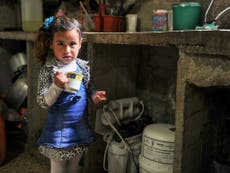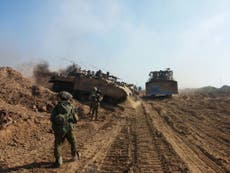As a surgeon who worked in Gaza last year, hearing that 511 Palestinians died after their ambulances were obstructed doesn't surprise me
While I was there a seven-year-old child bled to death before they could be treated

In July last year, Anas ‘Bader’ Hatem Qdeih, a seven-year-old boy already experiencing the fourth major conflict of his short life, was separated from his family as they fled with thousands of others from Israel’s bombardment of Khuza’a in northern Gaza. His mother and sisters managed to find shelter in a nearby kindergarten, but Bader was still running in the street when an artillery shell exploded nearby and his abdomen was cut open by shrapnel.
It took nearly four hours for an ambulance from the International Committee of the Red Cross to be permitted by the Israeli military into Khuza’a. They found Bader lying in the road, bleeding heavily from his injuries. On the way to hospital, the ambulance was stopped by Israeli soldiers at a checkpoint. They ordered everyone out, including Bader, who was placed on a stretcher on the ground while the vehicle was searched. After waiting for 27 minutes, they were permitted to leave for the hospital. Approximately four and a half hours after being struck down, Bader died in the back of the ambulance without ever reaching a hospital.
Bader’s case is tragic but, sadly, not unique. During last summer’s assault on Gaza, more than 2,100 Palestinians were killed. International law is very clear on the need to ensure access to remove and treat the wounded in times of conflict, and yet in Gaza last summer this was often prevented or delayed. New data has revealed that of these, 511 – including 67 children – never received medical assistance before their deaths due to obstructions to ambulance access.
I saw the effects of attacks on healthcare first-hand last summer while part of a Medical Aid for Palestinians surgical mission in Gaza’s Al Shifa Hospital. During the attacks, the outpatient department was hit by an airstrike and so many ambulances were struck that patients started refusing to get in them, preferring to be brought to us by car. In total, 16 medical workers were killed while on duty and 83, many of them ambulance drivers, were injured.
As a doctor, I believe that prevention is better than cure. This week at the UN Human Rights Council in Geneva states will be voting on what to do next, after the UN Commission of Inquiry’s report into the 2014 Gaza conflict found that war crimes had potentially been committed. The international community now has the chance to take the vital step toward preventing future violence that they have so far been unwilling to take. The UK and other members of the Human Rights Council must support access to justice and safety for victims, and accountability for all perpetrators to prevent sliding back into bloody conflict.
Since the ceasefire in August last year, the British Government has shown its commitment to this humanitarian cause by providing millions of pounds in aid to Gaza. However, the UK must combine its humanitarian efforts with diplomatic action to protect the integrity of international law, in the hope that Gaza’s children do not have to experience another war.
Dr Ghassan Abu Sittah is the Chief of Division of Plastic & Reconstructive Surgery at American University of Beirut (AUB) Medical Centre.



Join our commenting forum
Join thought-provoking conversations, follow other Independent readers and see their replies